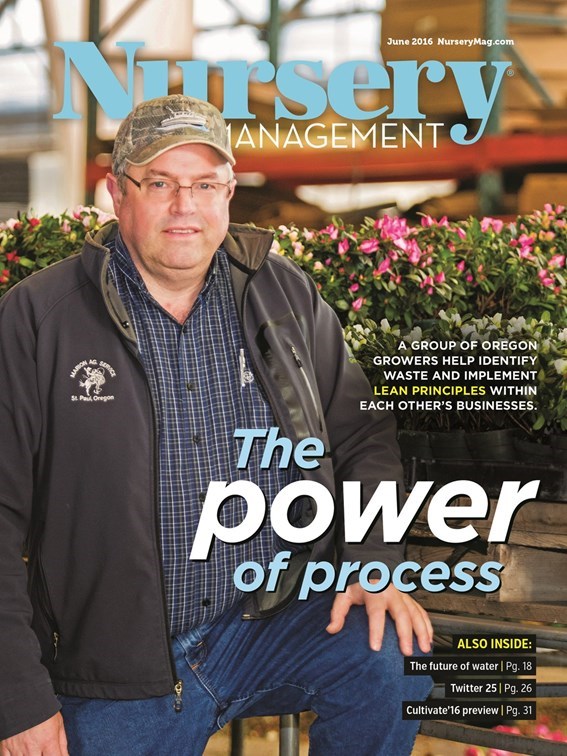The Cultivate’16 Nursery Tour takes place July 9, a day before the trade show begins in earnest. Attendees will experience three notable and diverse nursery operations within the greater Columbus area. For those of you who prefer to be hands-on and moving, this is the perfect opportunity to learn and see all at once. With honest and candid walk-around tours at each of these locations, you’ll get ideas aplenty for things to take home and modify for your needs.
The nursery tour is available as an add-on to your Cultivate’16 All-Access registration. Before June 17, the cost is $95 for AmericanHort members and $135 for non-members. After June 17, the cost increases to $115 for members and $160 for non-members. To register, visit www.cultivate16.org.Decker’s Nursery

Decker’s Nursery is a wholesale-only nursery renowned for incorporating practical and cost efficient mechanizations and processes into their production operation. Many of these innovations saw them through the 2008 recession and are seeing them into a bright future.
At Decker’s Nursery, the focus is on finished nursery stock, wholesale shrub liners and specialty grafted conifers. The nursery produces 1.2 million cuttings and 148,800 grafts annually and ships to 36 states. Decker’s has recently added automation into key production areas, a move that has improved productivity and also addresses the issue of labor shortages.
Nursery president Brian Decker has made many nursery modifications to accommodate automation, including expanding irrigation systems to fit between lines, reconfiguring greenhouse sizes to fit equipment, adjusting plant rows so that automated trimming machines can move over the plants, and covering outdoor lots with screening material for robotic material handling equipment.
For more: www.deckersnursery.com
Acorn Farms

The next stop on the tour is Acorn Farms, a wholesale-only nursery that sells to landscape and horticultural professionals. The nursery has more than 900 acres of production space spread over three production sites. The Galena site that attendees will tour encompasses container shrub and tree production, perennial and greenhouse production, and a sales yard. See the efficiencies and processes that make it all manageable and successful.
The 180-employee operation has made several changes to stay at its best, including a move away from peat to pine bark in its container mixes. Acorn Farms has a new pond and with a goal of 50-60 percent water recapture. Last year, Acorn Farms produced 13,000 container trees. The nursery has switched to pot-in-pot production on six acres. This process is designed to move away from the very labor intensive above-ground system.
For more: www.acornfarms.com
Smith’s Gardens

The final stop on the tour is Delaware, Ohio’s Smith’s Gardens. This family-owned wholesale container nursery specializes in perennials. Smith’s Gardens was initially started as a wholesale shrub nursery in 1981. More recently, the operation has converted to a perennial nursery and has begun growing grasses, ferns and edibles.
The nursery’s goal is to provide superior quality plants that are healthy, vigorous, true to name, and will provide immediate beauty in the landscape. Smith’s Gardens’ plant selections range from reliable, time-tested taxa to exciting, recent introductions. The nursery continuously upgrades its inventory to include new and improved varieties, and puts a concerted effort into offering plants that aren’t easily found in the retail market. Smith Gardens sells plants to garden centers in Ohio, Michigan and Indiana.
See how Smith’s Gardens keeps the end consumer in mind with practices such as packing their plants with more consumer-friendly labels. Every plant that leaves the nursery has a full-color adhesive label containing locally specific plant information. In 2015, Smith’s Gardens launched the “Feed the Caterpillars” line which has been very successful. In addition to the typical plant information, those tags show information about which caterpillars and butterflies use the plant as a food source.
For more: www.smithsgardensinc.com

Explore the June 2016 Issue
Check out more from this issue and find you next story to read.
Latest from Nursery Management
- GardenComm 2024 Annual Conference registration is open
- Landmark Plastic celebrates 40 years
- CropLife applauds introduction of Miscellaneous Tariff Bill
- Greenhouse 101 starts June 3
- Proven Winners introduces more than 100 new varieties for 2025
- CIOPORA appoints Micaela Filippo as vice secretary-general
- Rock Star Roses
- The container challenge





